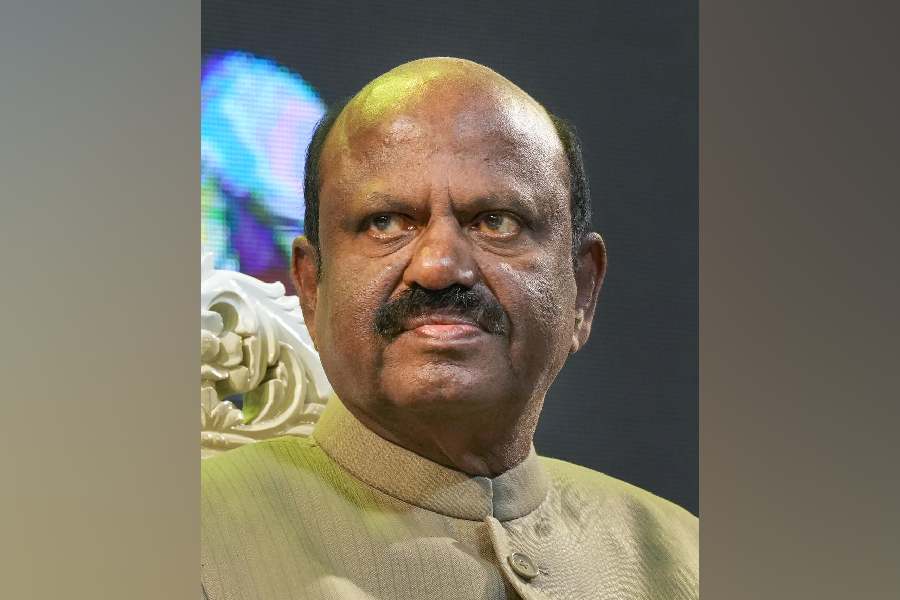Spot the irony
Sir — A hint is enough for the wise. For the wilfully blind, however, not even a blow from the hammer can drive facts home. It was thus ironical to witness President Donald Trump of the United States of America get emotional on receiving his grandfather’s birth certificate from Chancellor Friedrich Merz of Germany. Merz’s diplomatic reminder to Trump about his own immigrant past was as loaded as a hint can get. But it is futile to expect Trump to spot the hypocrisy of a nation built by immigrants slamming its doors shut for them while he celebrates his own immigrant past with teary-eyed nostalgia. For him, empathy and opportunity are privileges that are inherited alongside property, political power, and selectively sentimental family documents.
A.K. Sen,
Calcutta
Prey vanishes
Sir — The findings of the first-of-its-kind assessment of ungulates — hoofed mammals — conducted by the Wildlife Institute of India and the National Tiger Conservation Authority using data from India’s 2022 tiger census are important. The report reveals a striking contrast between well-managed tiger reserves and neglected forest divisions. Prey populations flourish within protected zones, yet decline sharply in adjoining forests and sanctuaries. This imbalance undermines long-term conservation goals. Tigers do not recognise bureaucratic boundaries; nor should conservation. India must strengthen protection in buffer zones, enforce anti-poaching laws, and restore degraded habitats beyond the core reserves. Otherwise, large carnivores will continue straying into human landscapes in search of food and pay the price for our inaction.
Sukhendu Bhattacharjee,
Howrah
Sir — The decline in ungulate populations across East and Central India signals a deeper ecological fracture. Tigers may symbolise India’s conservation success but without deer, bison and boar, they are little more than ghosts in shrinking forests. Habitat degradation, hunting, and infrastructure projects threaten not just prey species but the entire forest food chain. Conservation efforts must move beyond flagship species to protect the foundations of biodiversity. Without prey, there can be no predator and, soon, no forest worth protecting.
Asim Boral,
Calcutta
Sir — Tigers command global attention but their survival depends on far less glamorous creatures — the chital, sambar, gaur and wild pig. Declines in species such as barasingha and hog deer are not mere statistics; they reflect an ecological imbalance. The government must invest in prey restoration, grassland revival, and stronger protection in non-reserve areas, or tiger conservation risks collapsing from the bottom up.
Dhananjay Sinha,
Calcutta
Sir — Linear infrastructure has sliced through India’s forests, fragmenting habitats and isolating ungulate populations. This is not development; it is dismemberment of the country’s ecology. When floodplains are paved and grasslands levelled, species like hog deer and swamp deer vanish. In their absence, tigers wander into human settlements and man-animal conflict escalates. Wildlife corridors and landscape-level planning must no longer be optional. They are essential to prevent further ecological disarray and protect both wildlife and human communities.
Murtaza Ahmad,
Calcutta
Sir — The uneven distribution of ungulates across India should concern more than just wildlife enthusiasts. It is a mirror of poor planning, fragmented policies, and misplaced priorities. Mining, road-building and land-use changes have outpaced any serious attempt to integrate ecological concerns. As a recent report shows, East and Central India lack the prey base to support expanding tiger populations. Wildlife cannot thrive in policy vacuums. A coordinated national strategy must address habitat degradation and prey recovery as foundational to tiger conservation.
Srinjaya Bhattacharya,
Calcutta
Tech disadvantage
Sir — The expanding Artificial Intelligence-driven job market conceals a disturbing paradox. While skilled employment grows, so does structural unemployment — particularly for women, already disadvantaged by historic exclusion from STEM and unequal domestic burdens. As automation threatens clerical and low-skilled jobs, women in these sectors become especially vulnerable. Policy must now prioritise inclusive reskilling, childcare support, and legal safeguards against discriminatory layoffs. Without such interventions, the AI economy risks becoming a machine for deepening gender inequality rather than bridging it. Innovation must be matched by intention to ensure technology empowers, not excludes.
Kakoli Das,
Calcutta
More than stories
Sir — The death of Frederick Forsyth marks the end of a remarkable chapter in British literary history. His ability to transform espionage into art was unmatched. With The Day of the Jackal — tense, intelligent and immaculately researched — he redefined what a thriller could achieve. Few writers have commanded such respect from both readers and professionals within the intelligence community. His legacy will endure not only in bookshops and libraries but also in the real-world corridors of power he so vividly evoked.
Prabin Kanti Roy,
Calcutta
Sir — Frederick Forsyth often insisted that he was a journalist before anything else; yet he achieved literary immortality through fiction. His novels were not mere entertainers; they were geopolitical briefings in narrative form. Policymakers and spies alike turned to his books. Such widespread credibility is rare and may never be replicated.
Ritam Ghosh,
Calcutta











